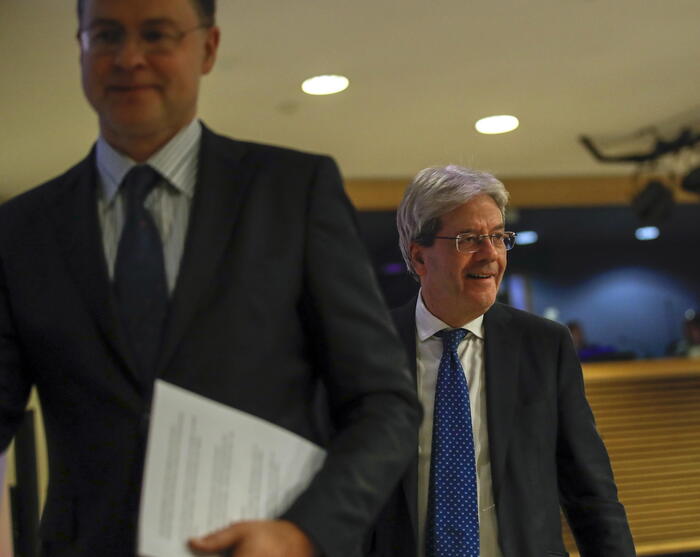At a press conference in Brussels, Executive Vice President Dombrovskis and Commissioner Gentiloni presented the reform of the Stability Pact
The proposed reform of the EU Stability Pact provides for safeguard measures on debt sustainability.
The reference values of 3% and 60% of GDP for deficit and debt remain unchanged.
At the end of the spending plan agreed by each state for the medium term (4 years), the ratio between public debt and GDP will have to be lower.
A minimum budget adjustment of 0.5% of GDP per year is then envisaged as long as the deficit remains above 3%.
The 0.5% adjustment 'safeguard' will be independent of the launch of an excessive deficit procedure.
The EU Commission lifts the veil on the proposal to reform economic governance.
States will indicate medium-term objectives (4 years) on how they intend to address macroeconomic imbalances and reforms, indicating only one expenditure indicator.
These plans, which can be extended by 3 years, will be evaluated by the Commission and approved by the Council.
States with a deficit over 3% of GDP or debt over 60% of GDP will have to ensure that the debt has a plausible decline or remains prudent in the plan and that the deficit falls or remains below 3% in the medium term: the executive speaks of it as a "technical trajectory".
The EU economic governance reform proposals "promote greater national ownership through medium-term fiscal structural plans prepared by the member states, within a common EU framework with sufficient guarantees".
This was stated
by EU Economy Commissioner Paolo Gentiloni.
They guarantee "simultaneously equal treatment and consideration of the specific situations of individual countries".
The rules will allow "a more credible application" by giving "the Member States more room for maneuver in defining budgetary trajectories".
The proposed reform of the EU Stability Pact takes "in consideration the different initial budgetary positions of the Member States and their different challenges in terms of public debt".
"By focusing on spending, we also avoid the typical pro-cyclical bias that fiscal policy has had in recent years" - continues Gentiloni.
And again, these proposals "will facilitate reforms and investment commitments, supported by an adjustment path".
"They should foster growth, support fiscal sustainability and address common EU priorities."
“They should ensure that the overall level of nationally funded public investment over the life of the plan is higher than in the previous period. And this is obviously a very significant innovation compared to the current framework.”
The EU Commission's proposal to reform the Stability Pact confirms the possibility of activating general safeguard clauses in the event of a severe economic recession in the EU or in the euro area which will allow deviation from spending targets.
Country-specific safeguard clauses will also be foreseen in case of exceptional circumstances beyond the control of the Member State with a material impact on public finances.
The Council, on the basis of a recommendation from the Commission, will decide on the activation and deactivation of these clauses.
"Last month the Council asked to complete the legislative work by the end of the year. And I am confident that we will be able to achieve this goal, if we are up to the challenge together" - stated Gentiloni.
"It is in the interest of all member states. It would reassure financial markets and investors. It would give governments clarity on the way forward, also considering the deactivation of the 'general escape clause' at the end of this year".
"I hope that an agreement can be reached between the various countries quickly because the suspension clause of the Stability Pact will only be in force until the end of the
year and I think that in general we cannot resign ourselves to a context in which debt continues to grow in European countries and growth remains very low.
High debt and low growth are not a reality to which the European economy can resign itself".
The European Commissioner for the Economy Paolo Gentiloni in Brussels
“While the proposals give Member States more control over their medium-term plans, they also provide for a stricter enforcement regime to ensure that Member States meet their commitments. For Member States facing substantial government debt challenges, deviation from the agreed fiscal adjustment path will automatically lead to the opening of an excessive deficit procedure".
"The requirement foreseen by the proposal for the adjustment paths is that there is an increase in public investment. I don't think it is acceptable that our rules lead to a progressive decline in public investment. We have to commit ourselves on the public expenditure front", he explained Gentiloni.
"
Have we decided to scrap the excessive deficit procedure?
No, we have decided to reconfirm it and in any case there is a benchmark, equal to 0.5%.
What we have added is to have a 0.5% reduction even before starting an excessive deficit procedure, it seems to me that the direction is the one expressed by the member countries of the debates," he added. "If the government wants to increase public spending , He can do it.
On the basis of this approach that goes against the cyclical trend we should reduce an excessive frequency of these infringement procedures, unless there are big mistakes, in which case there will be a very strict rule which is that of 0.5 %,” Dombrovskis added.
What we have added is to have a 0.5% reduction even before starting an excessive deficit procedure, it seems to me that the direction is the one expressed by the member countries of the debates," he added. "If the government wants to increase public spending , He can do it.
On the basis of this approach that goes against the cyclical trend we should reduce an excessive frequency of these infringement procedures, unless there are big mistakes, in which case there will be a very strict rule which is that of 0.5 %,” Dombrovskis added.
What we have added is to have a 0.5% reduction even before starting an excessive deficit procedure, it seems to me that the direction is the one expressed by the member countries of the debates," he added. "If the government wants to increase public spending , He can do it.
On the basis of this approach that goes against the cyclical trend we should reduce an excessive frequency of these infringement procedures, unless there are big mistakes, in which case there will be a very strict rule which is that of 0.5 %,” Dombrovskis added.
"We encourage and collaborate with the member states in order to have a meeting point on the reform of the Stability Pact. "We believe that the proposal is balanced" but "with a proposal from the Commission the legitimate different opinions of the member states can have the opportunity to progress ". European Commissioner Gentiloni was questioned at a press conference on the differences expected from the States and in particular the difficulties raised by Germany.
"We believe we have a balanced proposal," said
Commission Vice-President Valdis Dombrovskis.
“Our proposals represent a balanced approach that will make EU tax rules more effective. They are structured around four key areas: simplicity, ownership, safeguards and enforcement,” he continues.
"Member states will not be able to postpone fiscal adjustments to a later date. This also applies to carrying out the necessary reforms and investments."
“If a country's public deficit remains above 3% of GDP, it will have to make a minimum fiscal adjustment of 0.5% of GDP per year, to be applied as a common benchmark. nor 'backloading'"
The Vice-President of the Commission Valdis Dombrovskis and Paolo Gentiloni
"A new government will be able to ask for a revision of the structural budget and in this case the Commission will publish a new technical trajectory. But a reduction in the budget commitment will not be allowed".
Dombrovskis said this when answering those who asked him whether a government's four-year or seven-year plan of reforms and investments could be changed.
"We will also take into account the political cycle," added Gentiloni.
On the reduction of debt with the new stability pact "certainly this pace will be much more gradual and reasonable than the rule of the twentieth, which in fact has made the implementation of debt reduction mechanisms very difficult over the last 10-15 years " - continues.
Regarding the country, the EU Commissioner for the Economy underlines how "Italy will have to reduce the level of its debt. I believe that there is no Italian who is not aware, not just in government".
"When this reform is approved, Italy will be able to do it more gradually and it will also be able to do it in the way that Italy has decided".
"We encourage investments with a mechanism that is not the classic one of different accounting of some investments compared to others, what in jargon is called the golden rule".
In the reform "we create greater fiscal space by lengthening the adjustment time: the debt must already be reduced very gradually and it can be reduced even more gradually if we focus on investments in some sectors"


/cloudfront-eu-central-1.images.arcpublishing.com/prisa/BSW76ADTMZBGXEN5B5THLU2R7M.jpg)




